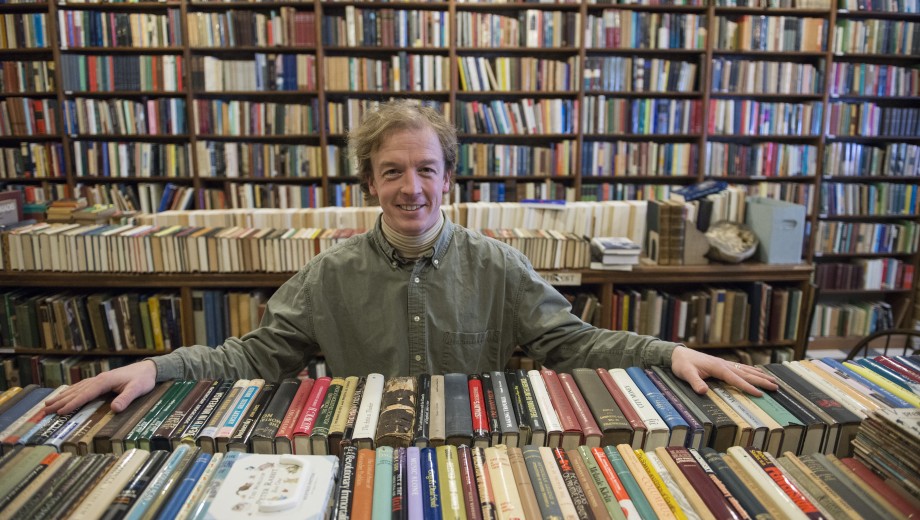Every humanities student is obsessed with books. What else gives you an edge with potential employers?
“It’s a fairly crowded field and if you want to stand out you have to have a bit of the go-getter about you,” says Joanna MacKenzie, AM’02, a literary agent at Browne and Miller. “There’s a certain hunger that has to be present as well. You have to not only love books and be a book person—that’s huge—you have to also want to influence popular culture and be excited about doing that.”
Lindsay Waters, AM’70, PhD’76, executive editor for the humanities at Harvard University Press, agrees. Whenever people tell him they want to work in publishing, he asks, “What’s the first book that you would want to publish?” If they can’t answer, he wonders if they’re right for the job. The best candidates for acquisitions work are those who can relentlessly hunt for books, he says, following their own intense interest in ideas. The main reward at an academic press isn’t financial but intellectual: “You have a chance to change the world and to reach people’s minds.”
Allison Wright, AM’08, US dictionaries editor at Oxford University Press, thinks that publishing work requires both a creative and strategic mind. “You have to be able to look at the potential of a book or a product in the current environment but also imagine what it could possibly turn into in the future,” she says. The dictionaries she works on are “living creatures” that must compete with print, online, and mobile products; many of them are free. “We’re constantly thinking about the way we present our content [and what about it] would make people want to come to us.”
What skills did you have to learn on the job?
As a graduate student, MacKenzie studied cinema and wanted to be a film critic. Her master’s thesis examined romantic comedies in which the main character “settles” instead of holding out for a happy ending. Today her job requires strong editing and writing skills—and she occasionally sends books out to film agents—but she learned new skills too, such as pitching an author’s work and negotiating contracts. “Going to work was such a different experience from going to school,” MacKenzie admits. “At the end of the day, we are running a business, and I’m here to make money for our clients and the business.”
Waters made a splash at in his first publishing job at the University of Minnesota Press with titles like Terry Eagleton’s Literary Theory: An Introduction. Later, he says with a laugh, Harvard University Press director Arthur Rosenthal hired him because “he wanted me to do weird books that could set people’s minds on fire.” Over time Waters learned to sell projects by following decidedly unweird principles. “To promote books to colleagues, I have found that the best way is to explain how it fits into a plan, how it builds on strengths already conspicuous in the press, and how it makes the press more essential to the operation of the university.”
Both Waters and Wright say they wish they had studied accounting before they began their first jobs. Basic training in finance, web design and development, and graphic design and coding for e-books are useful for anyone working in publishing, Wright adds.
What were some of your favorite publishing projects?
MacKenzie’s first solo sale as an agent was All Unquiet Things, a young-adult novel by Anna Jarzab, AM’07. She took special delight in placing the manuscript at Random House since Jarzab—who is about to publish her third novel and works in digital marketing at Penguin Young Readers Group—was a former intern and fellow graduate of the Master of Arts Program in the Humanities. Another young-adult manuscript that MacKenzie sold, Kristen Simmons’s Article 5, was a critical and commercial success for Macmillan.
Editorial associate Tim McGovern, AB’99, AM’01, mentions two recent projects as among his favorites at the University of Chicago Press. The first is a translation from the German of Harald Weinrich’s On Borrowed Time: The Art and Economy of Living with Deadlines, which he calls “a profound and wide-ranging reflection on the fact of human mortality.” McGovern also enjoyed working on I Speak of the City: Mexico City at the Turn of the Twentieth Century by UChicago historian Mauricio Tenorio-Trillo, “a lovely portrait of Mexico City, full of revelations to me as a reader.”
After three decades in publishing, Waters has helped bring many manuscripts to print, from 3,000 pages of the writings of Walter Benjamin to works by the feminist legal scholar Catharine MacKinnon. He says he is proud to have published books on topics from race to rock and roll, including Greil Marcus’s Lipstick Traces: A Secret History of the Twentieth Century and Patricia J. Williams’s Alchemy of Race and Rights.
Do you have any other advice?
Although MacKenzie has spent more than a decade in Chicago, she thinks anyone serious about book publishing should consider moving to New York. Many agencies and the “big five or six” publishers are there, she says: “Get your foot in the door and start working as an editorial assistant.”
Learning as an apprentice—doing the job as it evolves—may be the only way to prepare for work in a rapidly changing field. McGovern says he is uncertain where book publishing will be in five, ten, or 15 years. “If you look at the tasks of academic publishing in the broadest terms—facilitating the flow of ideas, testing new ideas, creating communities of scholarship—then there are a lot of ways to envision the career path,” he says.
“Maybe ‘career jungle’ is a better metaphor,” he continues, “not for the threatening-wildlife aspect, but for the lush richness of life, its diversity and density, combined with the need to find your own way.”

